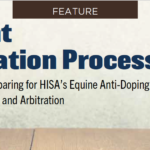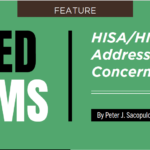The Horseracing Integrity Safety Authority (HISA) and Horseracing Integrity and Welfare Unit (HIWU) rules governing adjudication of disputes continue to be the subject of attack for denying the covered person required due process.
“As the first series of alleged Anti-Doping and Medication Control (ADMC) violations progress through the adjudication process, HISA and HIWU have made exceptions and variations to regulations, without formal amendment, in an attempt to mitigate the due process challenges. This approach is problematic regarding consistency and application. Even more concerning is that HIWU is making these exceptions and variations without following the required protocol for rule changes, fueling the nondelegation doctrine argument that the Thoroughbred business is, indeed, being governed by a private entity absent Federal Trade Commission (FTC) oversight.
A recent HIWU case in Pennsylvania offers an example. The covered person, a trainer, waived his right to the provisional hearing because he was financially unable to pay for two hearings—the provisional hearing and the arbitration.
The covered person, on advice of counsel, proceeded directly to a hearing before a HIWU-selected and -appointed arbitrator. The cost of the arbitration was $15,000 per day. When the covered person informed HIWU officials he could not afford half of the arbitration fee, HIWU responded that the expense, assuming the covered person was unsuccessful in defending the allegations against him, would be added on to the monetary penalty issued against him. So too would be the covered person’s portion of the cost of the hearing transcript and the cost of the translator. These concessions were made and offered without any formal change to the adjudication rules.
These concessions are a hollow attempt to placate those being denied their constitutionally protected right of due process under the adjudication rules. Additionally, if a covered person is unsuccessful in their defense of the allegations, all of HIWU’s expenses will be “tacked on” to the amount they will owe. However, if the outcome is the opposite, the covered person has no cause of action to recover the expenses they have incurred for attorney fees, experts, etc.
HISA also has made modifications and exceptions to rules by way of written notice. An example occurred July 28 regarding the rule governing” “provisional suspension. The change resulted from a covered person who, upon receiving notice of a positive test result and having timely requested a split or B sample, was unfairly excluded, without a hearing or due process, from participation in racing until the result of the B sample was received.
In this case, the covered person was excluded, his reputation tarnished and his business financially impacted during the period of suspension, despite the fact that the B sample was negative. This clear violation of the covered person’s person’s right to due process under the Fourth and 14th Amendments resulted in HISA changing the rule and consequences of a provisional suspension.
A covered person with a positive test result is currently immediately subject to a provisional suspension, but the effective date of that provisional suspension is postponed until the earlier of the following occurs: (1) the covered person waives the B sample analysis either affirmatively or by default, or (2) the covered person requests the B sample analysis and the B sample confirms the adverse analytical finding of the A sample. The postponed provisional suspension is imposed as active if and when the B sample is waived or the B sample confirms the finding of the A sample. The covered person then has the opportunity for a provisional hearing or an expedited hearing on the merits on a timely basis after the provisional suspension is active in accordance with Anti- Doping Medication Control Rule 3262 (Expedited Hearing).
Due process requires the right to reasonable notice of the charges and an opportunity to be heard at a meaningful time and in a meaningful manner. The HISA/HIWU rules governing adjudication violate that right by creating a price for due process that is too costly for nearly all participating in the Thoroughbred industry.
The trainer, groom and hotwalker are not capable of mounting a defense when the costs for attorneys, experts, translators, split samples, arbitrators and court reporters total tens of thousands of dollars. Tacking on certain self-selected costs to working horsemen does not restore due process to this administrative scheme.
Despite the efforts of HISA and HIWU in this regard, the covered person is not guaranteed a right to review by the ultimate administrative authority, the FTC. What the covered person is guaranteed is the right to have a hearing in a court of law. That right, under the HISA/HIWU adjudication rules, comes before a U.S. Court of Appeals and at an average cost of $30,000 to $50,000. That’s not much due process for the person who cannot afford to get into the “due process room,” nor is this much salvation for the covered person who has incurred a $2,000 split sample fee, a $15,000 arbitration fee and other costs tacked on to their monetary penalty.
The takeaway points from the initial efforts by HISA and HIWU to perform their own private “McConnell fix” are that a group of privately self-selected persons is not constitutionally powered to serve as the Thoroughbred industry’s due process gatekeeper and that, despite the recent efforts of HISA and HIWU, the covered person is left without the constitutional right of due process.”
—-
Originally published by The Horsemens Journal – Fall 2023






